SpringMVC简单使用教程
一、SpringMVC简单入门,创建一个HelloWorld程序
1.首先,导入SpringMVC需要的jar包。
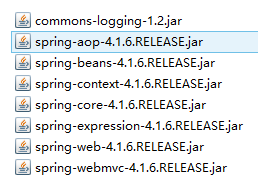
2.添加Web.xml配置文件中关于SpringMVC的配置
<!--configure the setting of springmvcDispatcherServlet and configure the mapping-->
<servlet>
<servlet-name>springmvc</servlet-name>
<servlet-class>org.springframework.web.servlet.DispatcherServlet</servlet-class>
<init-param>
<param-name>contextConfigLocation</param-name>
<param-value>classpath:springmvc-servlet.xml</param-value>
</init-param>
<!-- <load-on-startup>1</load-on-startup> -->
</servlet>
<servlet-mapping>
<servlet-name>springmvc</servlet-name>
<url-pattern>/</url-pattern>
</servlet-mapping>
3.在src下添加springmvc-servlet.xml配置文件
<?xml version="1.0" encoding="UTF-8"?>
<beans xmlns="http://www.springframework.org/schema/beans"
xmlns:xsi="http://www.w3.org/2001/XMLSchema-instance"
xmlns:context="http://www.springframework.org/schema/context"
xmlns:mvc="http://www.springframework.org/schema/mvc"
xsi:schemaLocation="http://www.springframework.org/schema/beans http://www.springframework.org/schema/beans/spring-beans.xsd
http://www.springframework.org/schema/context http://www.springframework.org/schema/context/spring-context-4.1.xsd
http://www.springframework.org/schema/mvc http://www.springframework.org/schema/mvc/spring-mvc-4.1.xsd">
<!-- scan the package and the sub package -->
<context:component-scan base-package="test.SpringMVC"/>
<!-- don't handle the static resource -->
<mvc:default-servlet-handler />
<!-- if you use annotation you must configure following setting -->
<mvc:annotation-driven /> <!-- configure the InternalResourceViewResolver -->
<bean class="org.springframework.web.servlet.view.InternalResourceViewResolver"
id="internalResourceViewResolver">
<!-- 前缀 -->
<property name="prefix" value="/WEB-INF/jsp/" />
<!-- 后缀 -->
<property name="suffix" value=".jsp" />
</bean>
</beans>
4.在WEB-INF文件夹下创建名为jsp的文件夹,用来存放jsp视图。创建一个hello.jsp,在body中添加“Hello World”。
5.建立包及Controller,如下所示:

6.编写Controller代码
@Controller
@RequestMapping("/mvc")
public class mvcController {
@RequestMapping("/hello")
public String hello(){
return "hello";
}
}
7.启动服务器,键入 http://localhost:8080/项目名/mvc/hello
二、配置解析
1.Dispatcherservlet
DispatcherServlet是前置控制器,配置在web.xml文件中的。拦截匹配的请求,Servlet拦截匹配规则要自已定义,把拦截下来的请求,依据相应的规则分发到目标Controller来处理,是配置spring MVC的第一步。
2.InternalResourceViewResolver
视图名称解析器
3.以上出现的注解
@Controller 负责注册一个bean 到spring 上下文中
@RequestMapping 注解为控制器指定可以处理哪些 URL 请求
三、SpringMVC常用注解
@Controller
负责注册一个bean 到spring 上下文中
@RequestMapping
注解为控制器指定可以处理哪些 URL 请求
@RequestBody
该注解用于读取Request请求的body部分数据,使用系统默认配置的HttpMessageConverter进行解析,然后把相应的数据绑定到要返回的对象上 ,再把HttpMessageConverter返回的对象数据绑定到 controller中方法的参数上
@ResponseBody
该注解用于将Controller的方法返回的对象,通过适当的HttpMessageConverter转换为指定格式后,写入到Response对象的body数据区
@ModelAttribute
在方法定义上使用 @ModelAttribute 注解:Spring MVC 在调用目标处理方法前,会先逐个调用在方法级上标注了@ModelAttribute 的方法
在方法的入参前使用 @ModelAttribute 注解:可以从隐含对象中获取隐含的模型数据中获取对象,再将请求参数 –绑定到对象中,再传入入参将方法入参对象添加到模型中
@RequestParam
在处理方法入参处使用 @RequestParam 可以把请求参 数传递给请求方法
@PathVariable
绑定 URL 占位符到入参
@ExceptionHandler
注解到方法上,出现异常时会执行该方法
@ControllerAdvice
使一个Contoller成为全局的异常处理类,类中用@ExceptionHandler方法注解的方法可以处理所有Controller发生的异常
四、自动匹配参数
//match automatically
@RequestMapping("/person")
public String toPerson(String name,double age){
System.out.println(name+" "+age);
return "hello";
}
五、自动装箱
1.编写一个Person实体类
package test.SpringMVC.model;
public class Person {
public String getName() {
return name;
}
public void setName(String name) {
this.name = name;
}
public int getAge() {
return age;
}
public void setAge(int age) {
this.age = age;
}
private String name;
private int age; }
2.在Controller里编写方法
//boxing automatically
@RequestMapping("/person1")
public String toPerson(Person p){
System.out.println(p.getName()+" "+p.getAge());
return "hello";
}
六、使用InitBinder来处理Date类型的参数
//the parameter was converted in initBinder
@RequestMapping("/date")
public String date(Date date){
System.out.println(date);
return "hello";
} //At the time of initialization,convert the type "String" to type "date"
@InitBinder
public void initBinder(ServletRequestDataBinder binder){
binder.registerCustomEditor(Date.class, new CustomDateEditor(new SimpleDateFormat("yyyy-MM-dd"),
true));
}
七、向前台传递参数
//pass the parameters to front-end
@RequestMapping("/show")
public String showPerson(Map<String,Object> map){
Person p =new Person();
map.put("p", p);
p.setAge(20);
p.setName("jayjay");
return "show";
}
八、使用Ajax调用
//pass the parameters to front-end using ajax
@RequestMapping("/getPerson")
public void getPerson(String name,PrintWriter pw){
pw.write("hello,"+name);
}
@RequestMapping("/name")
public String sayHello(){
return "name";
}
$(function(){
$("#btn").click(function(){
$.post("mvc/getPerson",{name:$("#name").val()},function(data){
alert(data);
});
});
});
九、在Controller中使用redirect方式处理请求
//redirect
@RequestMapping("/redirect")
public String redirect(){
return "redirect:hello";
}
十、文件上传
1.需要导入两个jar包

2.在SpringMVC配置文件中加入
<!-- upload settings -->
<bean id="multipartResolver" class="org.springframework.web.multipart.commons.CommonsMultipartResolver">
<property name="maxUploadSize" value="102400000"></property>
</bean>
3.方法代码
@RequestMapping(value="/upload",method=RequestMethod.POST)
public String upload(HttpServletRequest req) throws Exception{
MultipartHttpServletRequest mreq = (MultipartHttpServletRequest)req;
MultipartFile file = mreq.getFile("file");
String fileName = file.getOriginalFilename();
SimpleDateFormat sdf = new SimpleDateFormat("yyyyMMddHHmmss");
FileOutputStream fos = new FileOutputStream(req.getSession().getServletContext().getRealPath("/")+
"upload/"+sdf.format(new Date())+fileName.substring(fileName.lastIndexOf('.')));
fos.write(file.getBytes());
fos.flush();
fos.close(); return "hello";
}
4.前台form表单
<form action="mvc/upload" method="post" enctype="multipart/form-data">
<input type="file" name="file"><br>
<input type="submit" value="submit">
</form>
十一、使用@RequestParam注解指定参数的name
@Controller
@RequestMapping("/test")
public class mvcController1 {
@RequestMapping(value="/param")
public String testRequestParam(@RequestParam(value="id") Integer id,
@RequestParam(value="name")String name){
System.out.println(id+" "+name);
return "/hello";
}
}
十二、Restful风格的SringMVC
1.RestController
@Controller
@RequestMapping("/rest")
public class RestController {
@RequestMapping(value="/user/{id}",method=RequestMethod.GET)
public String get(@PathVariable("id") Integer id){
System.out.println("get"+id);
return "/hello";
} @RequestMapping(value="/user/{id}",method=RequestMethod.POST)
public String post(@PathVariable("id") Integer id){
System.out.println("post"+id);
return "/hello";
} @RequestMapping(value="/user/{id}",method=RequestMethod.PUT)
public String put(@PathVariable("id") Integer id){
System.out.println("put"+id);
return "/hello";
} @RequestMapping(value="/user/{id}",method=RequestMethod.DELETE)
public String delete(@PathVariable("id") Integer id){
System.out.println("delete"+id);
return "/hello";
} }
2.form表单发送put和delete请求
在web.xml中配置:
<!-- configure the HiddenHttpMethodFilter,convert the post method to put or delete -->
<filter>
<filter-name>HiddenHttpMethodFilter</filter-name>
<filter-class>org.springframework.web.filter.HiddenHttpMethodFilter</filter-class>
</filter>
<filter-mapping>
<filter-name>HiddenHttpMethodFilter</filter-name>
<url-pattern>/*</url-pattern>
</filter-mapping>
在前台的请求:
<form action="rest/user/1" method="post">
<input type="hidden" name="_method" value="PUT">
<input type="submit" value="put">
</form> <form action="rest/user/1" method="post">
<input type="submit" value="post">
</form> <form action="rest/user/1" method="get">
<input type="submit" value="get">
</form> <form action="rest/user/1" method="post">
<input type="hidden" name="_method" value="DELETE">
<input type="submit" value="delete">
</form>
十三、返回json格式的字符串
1.导入以下jar包
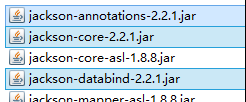
2.方法代码
@Controller
@RequestMapping("/json")
public class jsonController { @ResponseBody
@RequestMapping("/user")
public User get(){
User u = new User();
u.setId(1);
u.setName("jayjay");
u.setBirth(new Date());
return u;
}
}
十四、异常的处理
1.处理局部异常(Controller内)
@ExceptionHandler
public ModelAndView exceptionHandler(Exception ex){
ModelAndView mv = new ModelAndView("error");
mv.addObject("exception", ex);
System.out.println("in testExceptionHandler");
return mv;
} @RequestMapping("/error")
public String error(){
int i = 5/0;
return "hello";
}
2.处理全局异常(所有Controller)
@ControllerAdvice
public class testControllerAdvice {
@ExceptionHandler
public ModelAndView exceptionHandler(Exception ex){
ModelAndView mv = new ModelAndView("error");
mv.addObject("exception", ex);
System.out.println("in testControllerAdvice");
return mv;
}
}
3.另一种处理全局异常的方法
在SpringMVC配置文件中配置:
<!-- configure SimpleMappingExceptionResolver -->
<bean class="org.springframework.web.servlet.handler.SimpleMappingExceptionResolver">
<property name="exceptionMappings">
<props>
<prop key="java.lang.ArithmeticException">error</prop>
</props>
</property>
</bean>
说明:error是出错页面
十五、设置一个自定义拦截器
1.创建一个MyInterceptor类,并实现HandlerInterceptor接口
public class MyInterceptor implements HandlerInterceptor {
@Override
public void afterCompletion(HttpServletRequest arg0,
HttpServletResponse arg1, Object arg2, Exception arg3)
throws Exception {
System.out.println("afterCompletion");
}
@Override
public void postHandle(HttpServletRequest arg0, HttpServletResponse arg1,
Object arg2, ModelAndView arg3) throws Exception {
System.out.println("postHandle");
}
@Override
public boolean preHandle(HttpServletRequest arg0, HttpServletResponse arg1,
Object arg2) throws Exception {
System.out.println("preHandle");
return true;
}
}
2.在SpringMVC的配置文件中配置
<!-- interceptor setting -->
<mvc:interceptors>
<mvc:interceptor>
<mvc:mapping path="/mvc/**"/>
<bean class="test.SpringMVC.Interceptor.MyInterceptor"></bean>
</mvc:interceptor>
</mvc:interceptors>
3.拦截器执行顺序
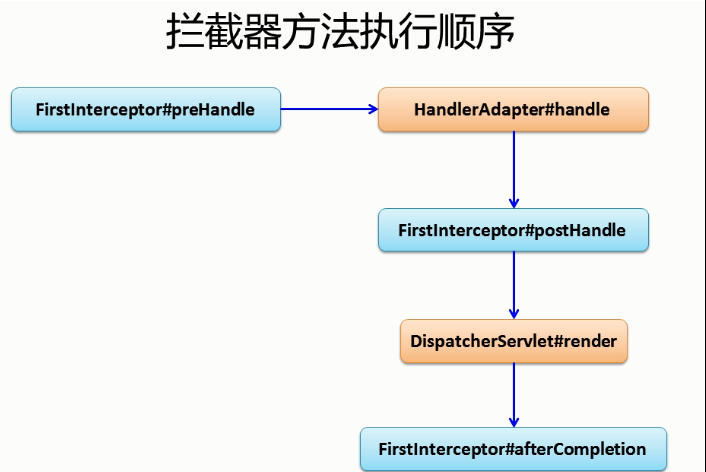
十六、表单的验证(使用Hibernate-validate)及国际化
1.导入Hibernate-validate需要的jar包
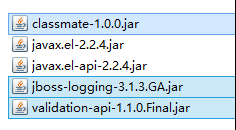

2.编写实体类User并加上验证注解
public class User {
public int getId() {
return id;
}
public void setId(int id) {
this.id = id;
}
public String getName() {
return name;
}
public void setName(String name) {
this.name = name;
}
public Date getBirth() {
return birth;
}
public void setBirth(Date birth) {
this.birth = birth;
}
@Override
public String toString() {
return "User [id=" + id + ", name=" + name + ", birth=" + birth + "]";
}
private int id;
@NotEmpty
private String name;
@Past
@DateTimeFormat(pattern="yyyy-MM-dd")
private Date birth;
}
说明:@Past表示时间必须是一个过去值
3.在jsp中使用SpringMVC的form表单
<form:form action="form/add" method="post" modelAttribute="user">
id:<form:input path="id"/><form:errors path="id"/><br>
name:<form:input path="name"/><form:errors path="name"/><br>
birth:<form:input path="birth"/><form:errors path="birth"/>
<input type="submit" value="submit">
</form:form>
说明:path对应name
4.Controller中代码
@Controller
@RequestMapping("/form")
public class formController {
@RequestMapping(value="/add",method=RequestMethod.POST)
public String add(@Valid User u,BindingResult br){
if(br.getErrorCount()>0){
return "addUser";
}
return "showUser";
} @RequestMapping(value="/add",method=RequestMethod.GET)
public String add(Map<String,Object> map){
map.put("user",new User());
return "addUser";
}
}
补充:
1.因为jsp中使用了modelAttribute属性,所以必须在request域中有一个"user".
2.@Valid 表示按照在实体上标记的注解验证参数
3.返回到原页面错误信息回回显,表单也会回显
5.错误信息自定义
在src目录下添加locale.properties
NotEmpty.user.name=name can't not be empty
Past.user.birth=birth should be a past value
DateTimeFormat.user.birth=the format of input is wrong
typeMismatch.user.birth=the format of input is wrong
typeMismatch.user.id=the format of input is wrong
在SpringMVC配置文件中配置
<!-- configure the locale resource -->
<bean id="messageSource" class="org.springframework.context.support.ResourceBundleMessageSource">
<property name="basename" value="locale"></property>
</bean>
6.国际化显示
在src下添加locale_zh_CN.properties
username=账号
password=密码
locale.properties中添加
username=username
password=password
创建一个locale.jsp
<body>
<fmt:message key="username"></fmt:message>
<fmt:message key="password"></fmt:message>
</body>
在SpringMVC中配置
<!-- make the jsp page can be visited -->
<mvc:view-controller path="/locale" view-name="locale"/>
让locale.jsp在WEB-INF下也能直接访问
最后,访问locale.jsp,切换浏览器语言,能看到账号和密码的语言也切换了
十七、整合SpringIOC和SpringMVC
1.创建一个test.SpringMVC.integrate的包用来演示整合,并创建各类

2.User实体类
public class User {
public int getId() {
return id;
}
public void setId(int id) {
this.id = id;
}
public String getName() {
return name;
}
public void setName(String name) {
this.name = name;
}
public Date getBirth() {
return birth;
}
public void setBirth(Date birth) {
this.birth = birth;
}
@Override
public String toString() {
return "User [id=" + id + ", name=" + name + ", birth=" + birth + "]";
}
private int id;
@NotEmpty
private String name;
@Past
@DateTimeFormat(pattern="yyyy-MM-dd")
private Date birth;
}
3.UserService类
@Component
public class UserService {
public UserService(){
System.out.println("UserService Constructor...\n\n\n\n\n\n");
} public void save(){
System.out.println("save");
}
}
4.UserController类
@Controller
@RequestMapping("/integrate")
public class UserController {
@Autowired
private UserService userService; @RequestMapping("/user")
public String saveUser(@RequestBody @ModelAttribute User u){
System.out.println(u);
userService.save();
return "hello";
}
}
5.Spring配置文件
在src目录下创建SpringIOC的配置文件applicationContext.xml
<?xml version="1.0" encoding="UTF-8"?>
<beans xmlns="http://www.springframework.org/schema/beans"
xmlns:xsi="http://www.w3.org/2001/XMLSchema-instance"
xsi:schemaLocation="http://www.springframework.org/schema/beans
http://www.springframework.org/schema/beans/spring-beans.xsd
http://www.springframework.org/schema/util
http://www.springframework.org/schema/util/spring-util-4.0.xsd
http://www.springframework.org/schema/context
http://www.springframework.org/schema/context/spring-context.xsd
"
xmlns:util="http://www.springframework.org/schema/util"
xmlns:p="http://www.springframework.org/schema/p"
xmlns:context="http://www.springframework.org/schema/context"
>
<context:component-scan base-package="test.SpringMVC.integrate">
<context:exclude-filter type="annotation"
expression="org.springframework.stereotype.Controller"/>
<context:exclude-filter type="annotation"
expression="org.springframework.web.bind.annotation.ControllerAdvice"/>
</context:component-scan> </beans>
在web.xml中添加配置
<!-- configure the springIOC -->
<listener>
<listener-class>org.springframework.web.context.ContextLoaderListener</listener-class>
</listener>
<context-param>
<param-name>contextConfigLocation</param-name>
<param-value>classpath:applicationContext.xml</param-value>
</context-param>
6.在SpringMVC中进行一些配置,防止SpringMVC和SpringIOC对同一个对象的管理重合
<!-- scan the package and the sub package -->
<context:component-scan base-package="test.SpringMVC.integrate">
<context:include-filter type="annotation"
expression="org.springframework.stereotype.Controller"/>
<context:include-filter type="annotation"
expression="org.springframework.web.bind.annotation.ControllerAdvice"/>
</context:component-scan>
十八、SpringMVC详细运行流程图
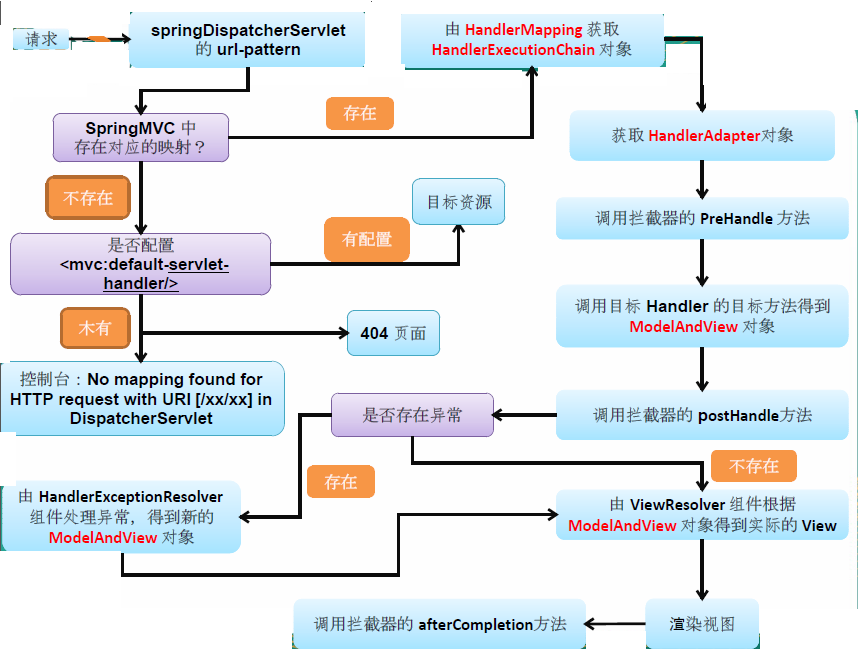
十九、SpringMVC运行原理
1. 客户端请求提交到DispatcherServlet
2. 由DispatcherServlet控制器查询一个或多个HandlerMapping,找到处理请求的Controller
3. DispatcherServlet将请求提交到Controller
4. Controller调用业务逻辑处理后,返回ModelAndView
5. DispatcherServlet查询一个或多个ViewResoler视图解析器,找到ModelAndView指定的视图
6. 视图负责将结果显示到客户端
二十、SpringMVC与struts2的区别
1、springmvc基于方法开发的,struts2基于类开发的。springmvc将url和controller里的方法映射。映射成功后springmvc生成一个Handler对象,对象中只包括了一个method。方法执行结束,形参数据销毁。springmvc的controller开发类似web service开发。
2、springmvc可以进行单例开发,并且建议使用单例开发,struts2通过类的成员变量接收参数,无法使用单例,只能使用多例。
3、经过实际测试,struts2速度慢,在于使用struts标签,如果使用struts建议使用jstl。
SpringMVC简单使用教程的更多相关文章
- SpringMVC简单实例(看起来有用)
SpringMVC简单实例(看起来有用) 参考: SpringMVC 基础教程 简单入门实例 - CSDN博客http://blog.csdn.net/swingpyzf/article/detail ...
- OpenMP的简单使用教程
转自:http://binglispace.com/2015/01/09/openmp-intro/ OpenMP的简单使用教程 今天有幸参加了一个XSEDE OpenMP的workshop讲座,真是 ...
- 程序员,一起玩转GitHub版本控制,超简单入门教程 干货2
本GitHub教程旨在能够帮助大家快速入门学习使用GitHub,进行版本控制.帮助大家摆脱命令行工具,简单快速的使用GitHub. 做全栈攻城狮-写代码也要读书,爱全栈,更爱生活. 更多原创教程请关注 ...
- knockout简单实用教程3
在之前的文章里面介绍了一些KO的基本用法.包括基本的绑定方式,基本的ko的绑定语法包括text绑定,html绑定等等(如有不明请参照上两篇文章),下面呢介绍一下关于ko的其他方面的知识.包括比较特殊绑 ...
- GitHub这么火,程序员你不学学吗? 超简单入门教程 【转载】
本GitHub教程旨在能够帮助大家快速入门学习使用GitHub. 本文章由做全栈攻城狮-写代码也要读书,爱全栈,更爱生活.原创.如有转载,请注明出处. GitHub是什么? GitHub首先是个分布式 ...
- SpringMVC简单配置
SpringMVC简单配置 一.eclipse安装Spring插件 打开help下的Install New Software 点击add,location中输入http://dist.springso ...
- SpringMVC简单入门
SpringMVC简单入门 与大家分享一下最近对SpringMVC的学习,希望本文章能对大家有所帮助. 首先什么是SpringMVC? Spring 为展现层提供的基于MVC设计理念的优秀的Web框架 ...
- sea.js简单使用教程
sea.js简单使用教程 下载sea.js, 并引入 官网: http://seajs.org/ github : https://github.com/seajs/seajs 将sea.js导入项目 ...
- vim简单使用教程【转】
vim的学习曲线相当的大(参看各种文本编辑器的学习曲线),所以,如果你一开始看到的是一大堆VIM的命令分类,你一定会对这个编辑器失去兴趣的.下面的文章翻译自<Learn Vim Progress ...
随机推荐
- js中的函数重载
函数重载与js 什么是函数重载 重载函数是函数的一种特殊情况,为方便使用,C++允许在同一范围中声明几个功能类似的同名函数,但是这些同名函数的形式参数(指参数的个数.类型或者顺序)必须不同,也就是说用 ...
- XSS攻击及防范
1.什么是XSS攻击 跨站脚本攻击(Cross Site Scripting),攻击者往Web页面里插入恶意Script代码,当用户浏览该页之时,嵌入其中Web里面的Script代码会被执行,从而达到 ...
- wpf遮罩~~~(搬运过来的)
方便自己以后用,原文:https://blog.csdn.net/lwwl12/article/details/78472235 直接上代码 public partial class BaseWind ...
- Xgboost参数调节
转自:https://segmentfault.com/a/1190000014040317 整体: # 1.调试n_estimators cv_params = {'n_estimators': [ ...
- EF 配置多个数据库
1.先创建两个DbContext using System; using System.Data.Common; using System.Data.Entity; using System.Data ...
- IDE介绍之——CLion
CLion是JetBrains公司旗下发布的一款跨平台C/C++IDE开发工具. 使用CLion上最好要会手写CMake.要先安装编译器套件(一般安装MinGW就行). 对C++标准的支持:基本上Cl ...
- struts2生成随机验证码图片
之前想做一个随机验证码的功能,自己也搜索了一下别人写的代码,然后自己重新用struts2实现了一下,现在将我自己实现代码贴出来!大家有什么意见都可以指出来! 首先是生成随机验证码图片的action: ...
- C语言中的断言
一.原型定义:void assert( int expression ); assert宏的原型定义在<assert.h>中,其作用是先计算表达式 expression ,如果expres ...
- python 批量生成xml标记文件(连通域坐标分割)
#!/usr/bin/python # -*- coding=utf-8 -*- # author : Manuel # date: 2019-05-15 from xml.etree import ...
- PRML第一章读书小结
PRML第一章读书小结 第一章用例子出发,较为简单的引入了概率论.模型.决策.损失.信息论的问题,作为机器学习从业者,读PRML除了巩固已有基础,还受到了很多新的启发,下面将我收到的启发总结如 ...
